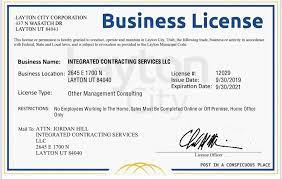
Malaysia’s one thousand and one licences

Letter to Editor
IT is about time for the Government to ease the conduct of businesses in the country. I remember many years ago, Royal Selangor Pewter’s founder Yong Poh Kon was asked to helm the Pemudah initiative. As a result, the procedures of certain government agencies were simplified.
This was an important initiative, as bureaucrats are always seeking for quick “solutions” by introducing more licenses.
Too costly to operate a legitimate business

It goes without saying that with the creation of one additional license, it also means an opportunity for government officials who are on the take to ask for “under the table” money (bribe).
In some cases, it takes months before a licence is issued, as the approval has to go through several stages. Unless it is business, people have always complained that bribery is a major problem whenever they have to apply for these licenses.
It is only at the stage of approval but not at the enforcement level. Without a proper license, a restaurant operator, for example, can be issued a summons, while his neighbour carrying out all sorts of illegal extensions outside the premises can get away without even a knock on their door by the same enforcement officers.
While having my lunch one day in Kepong, the supervisor of a restaurant was approached by three Kuala Lumpur City Hall Council (DBKL) members about the foreign workers that the owner had hired. They wanted the restaurant owner’s phone number.
I was listening to the conversation. Because the supervisor himself was a foreign worker, I decided to ask the officers, “Why do you need to know the number of foreign workers?”
He claimed that his new boss wanted the information. When I retorted saying that it has nothing to do with DBKL, the officer started to raise his voice. He did not know I knew the personal assistant to the Kuala Lumpur City Hall and I could also bring the matter to the local Member of Parliament, Dr Tan Seng Giaw.
He claimed that his new boss wanted the information. When I retorted, saying that it has nothing to do with DBKL, the officer started to raise his voice. He was unaware that I knew the DBKL personal assistant and that I could also bring the matter to the attention of the local MP Dr Tan Seng Giaw.
After I raised the matter with Dr Tan, he brought it up to the city mayor. I am not sure what happened after that. But, just to operate a restaurant, you will need at least 10 different licenses, depending on what you are offering:
- Malaysia Signboard License
- Liquor License in Malaysia
- Halal License
- Music Authors’ Copyright Protection Berhad License (MACP)
- Public Performance Malaysia License (PPM)
- Food Establishment Licensing in Malaysia
- Food Handling License in Malaysia
- Malaysia Composite License
- Wholesale and Retail Trade (WRT) License in Malaysia
Having just read my first draft of this article, a restaurant operator of an Italian restaurant immediately wrote to me:
“Hope they hear this. Yes, it’s all about milking businesses. In order to have music in shops regardless if music is central to the business like a live band or performer, one has to pay the same. Hence, I’ve removed everything or risk a rm10k fine if you don’t have a license.
“Then the music copyrights. Three organisations as opposed to a combined licensing sometime back as they could not agree.

Then you suddenly have surprise inspectors from ministries who highlight archaic regulations n ask for free meals etc.”
Along with these licences comes the cost of applying for a business license. Sometimes, there are so many licences that even potential entrepreneurs find it hard to even start a business.
Along with these licences comes the cost of applying for a business license. Sometimes, there are so many licences that even potential entrepreneurs find it hard to even start a business.
And when something tragic happens like the Batang Kali landslide, fingers will start pointing at the poor operator of the campsite who did not have a proper license.
Isn’t this what we hear from Hulu Selangor Local Council? We never hear their admission of failure to check on these so-called “unlicensed” premises. Why?
But, as the campsite operator puts it at a press conference, he “could not apply for a campsite licence because such a permit does not exist.” Period.
With this, I wonder if the local council will create another licence called “Camping License.” This may be a tongue-in-cheek statement, but isn’t it true what is happening in the country?
I guess the solution should not be to hammer out another licence for camping sites, but rather to do what makes more sense — if the landslide is due to soil movement, the root cause of the landslide must be monitored closely. And I think this is one area where the local authorities have failed miserably, not only in the Batang Kali tragedy but in a number of other tragedies in the past and in the future.
Isn’t this what we hear from Hulu Selangor Local Council? We never hear their admission of failure to check on these so-called “unlicensed” premises. Why?
But, as the campsite operator puts it at a press conference, he “could not apply for a campsite licence because such a permit does not exist.” Period.
With this, I wonder if the local council will create another licence called “Camping License.” This may be a tongue-in-cheek statement, but isn’t it true what is happening in the country?
I guess the solution should not be to hammer out another licence for camping sites, but rather to do what makes more sense — if the landslide is due to soil movement, the root cause of the landslide must be monitored closely. And I think this is one area where the local authorities have failed miserably, not only in the Batang Kali tragedy but in a number of other tragedies in the past and in the future.


Meanwhile, we are sad to see so many of them dead, and the operator of the organic farm, having done such a fabulous job in developing the farm, may not even rebound while those so obsessed with advising the minister about licences get away scot-free.
Real problems
While there is a need to regulate any industry, the real problem with our Malaysian authorities is not the number of licences that they can issue but that they are killing the goose that lays the golden eggs.
What is lacking is both supervision and enforcement by the local authorities to the point that the ‘bad apples’ get away with a bribe, while those struggling to earn an honest living are being penalised. The Malaysia Anti-Corruption Commission (MACC) is fully aware of what is happening on the ground, but not enough is being done to arrest the problem.
Meanwhile, I hear threats from local council enforcement officers, who would inspect a property for any flaws they could find. They would not leave until a token was given to them.
While having a meal with Sungai Pelek state assemblyman Ronnie Liu one afternoon, I noticed about three Petaling Jaya City Hall enforcement officers walking into the restaurant in SS2, Petaling Jaya. We wanted to see what the officers would do. Before we realised it, they had walked into the kitchen. Soon after that, as I understand it, they left the premises through the back door.
This is a scenario that most small business owners would experience with the boys in uniform. The local councils do not need to take offence at what I mention here, as they can, in fact, set up their own traps if they are serious about corruption.
On BFM radio, this subject was also brought up. A food outlet, for example, was asked to pay RM77,000 if he wanted to continue operating his business. The deposit was RM50,000, with the license(s) costing an additional RM27,000.
I believe in the end, the business just ‘died.’ Over the years, we have seen video clips of a number of business operators and farmers experiencing the same problem. All of their years of hard work has gone down the drain in a matter of hours.
Hypothetically speaking
So, what if the operator of Father’s Organic Farm had a licence to operate a camping site? A disaster would still happen, and this is beyond their control. Therefore, the licence to operate the camp site is the last thing that one should even bring up when a disaster happens.
It is just a convenient way for the local council to pick a scapegoat. In my opinion, the finger should point back at the local council as the regulatory body.
Did they monitor the slopes adequately? They are probably aware of the dangers of a landslide during a heavy downpour, but why did they not stop the outdoor activities until the tragedy happened?
Just about two weeks ago, we were still able to visit Taman Eko Rimba Sungai Kanching. Before the tragedy that happened in Batang Kali, no one thought about the dangers of having their picnics beside a waterfall during the monsoon season.

Should a disaster have happened in this eco-resort run by the Selangor State Government, and suddenly a big volume of water gushed down the waterfall, would any local authority point fingers and blame it on the authority for not operating with a proper license?
We have already seen one tragedy after another, from the Highland Towers to the Pos Dipang tragedy, and yet we have not learned the hard lessons.
Instead of looking at just the licenses, the local authorities should closely monitor the illegal land clearing activities on hills and make sure that even licenced contractors follow the correct procedures.
In most cases, it is the soil movement resulting from some land clearing of rainforests, not operating without a license, that destroys the environment and causes many of the landslides in most parts of the country.
Moving forward, we should streamline all agency processes. Each government agency should be tasked with reducing its own bureaucracy in order to cut down on paperwork.
Fewer licences need to be put in place or maybe consolidated into one master licence to facilitate business start-ups, but more enforcement and supervision should be carried out to ensure the safety of all parties. — Dec 21, 2022
Stephen Ng
Kuala Lumpur
No comments:
Post a Comment